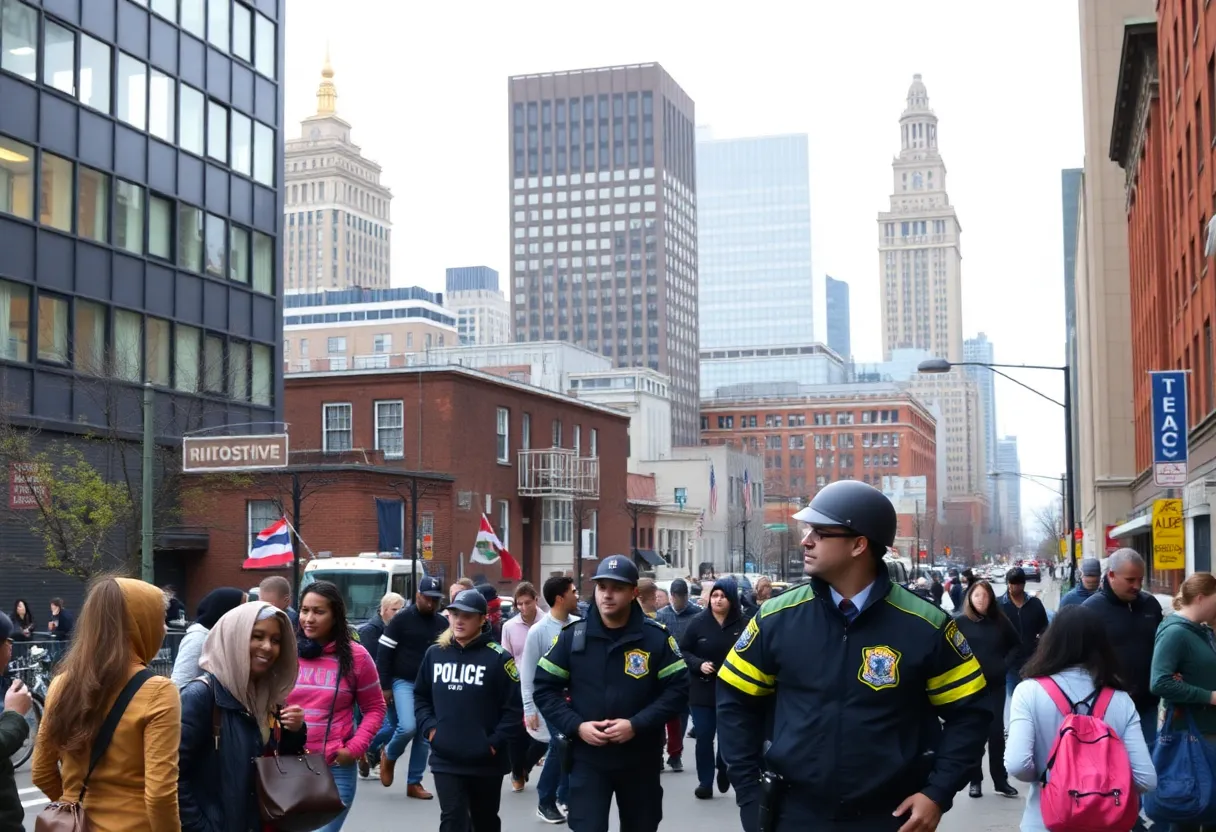Boston, August 19, 2025
News Summary
Boston’s mayor has publicly defended the city’s sanctuary policies during a press conference addressing threats from the federal government. The U.S. Attorney General sent letters demanding compliance with immigration laws, but the mayor reaffirmed the city’s Trust Act, which limits city police cooperation with federal immigration enforcement. The administration criticized the federal demands as overreach, emphasizing the importance of maintaining public trust and safety in immigrant communities. Boston is prepared to challenge any punitive measures and is supported by other jurisdictions facing similar pressures.
Boston
Mayor Defends Sanctuary Policies After Federal Threats
Boston’s mayor held a press conference Tuesday to respond to federal letters that threatened legal action and funding penalties against cities described as sanctuary jurisdictions. The letters, sent by the U.S. Attorney General to Boston and other local leaders, required detailed explanations of how cities would comply with federal immigration laws by a deadline set for the same day.
At the press event, the mayor said the city will not yield to federal pressure and framed the administration’s approach as an attempt to shift blame for broader policy failures. She pointed to Boston’s local policy, known as the Trust Act, as the basis for limiting cooperation between city police and federal immigration enforcement unless there is a criminal warrant. City officials emphasized that the Trust Act aims to protect public safety and maintain trust between law enforcement and immigrant communities.
Federal Letter and Potential Consequences
The federal communication warned that non-compliant cities could face lawsuits, reductions in federal funding, or other enforcement actions. The letter also suggested the possibility of criminal prosecution for local officials who refuse to cooperate with federal immigration enforcement efforts. The administration requested written compliance plans from affected jurisdictions, with the deadline falling on Tuesday.
City Response and Legal Position
Boston officials described the federal demands as overreach and said state laws and the city’s policies provide legal grounds for their approach. City leaders noted that past legal challenges to federal funding cuts have produced favorable outcomes for local governments, and they indicated readiness to pursue litigation again if necessary.
The mayor reiterated that Boston’s policies are designed to protect all residents and to ensure that victims and witnesses feel safe reporting crimes. Officials said the Trust Act contributes to public safety by limiting local involvement in federal immigration enforcement absent criminal warrants.
Local Reaction and Broader Support
The mayor’s remarks were met with applause from an audience that included municipal leaders, state officials, residents, and a Mariachi group. Other elected officials and legal authorities across the country expressed similar intent to resist federal pressure. Washington State’s governor announced plans to oppose the federal approach, and attorneys general in some states said they will defend state and local policies in court.
Jurisdictions that received similar federal letters include Cook County, Illinois; Philadelphia; New York City; and other cities commonly described as sanctuary jurisdictions. Connecticut’s attorney general stated the state has not violated federal law and is prepared to challenge any federal actions viewed as overreach. Philadelphia’s city attorney clarified the city’s stance as welcoming while distancing the city from the specific “sanctuary” label used in federal correspondence.
Legal and Policy Background
The dispute highlights ongoing tensions between federal immigration enforcement priorities and local policies that limit local participation in those efforts. Cities that have adopted sanctuary-style policies generally argue that restricting local cooperation with federal immigration authorities improves community safety by encouraging cooperation with local police. Federal officials contend that local noncompliance can obstruct national immigration enforcement objectives and may justify enforcement or funding consequences.
Boston’s Trust Act restricts local police from honoring most federal detainer requests without a judicial warrant. City leaders describe the policy as consistent with state law and longstanding court decisions addressing the limits of federal power over state and local officials. Legal observers note that disputes over funding and conditional federal grants often turn on constitutional and statutory questions that have produced mixed judicial outcomes in prior cases.
What Happens Next
With the compliance deadline passed, affected cities must decide whether to submit plans that align with federal requirements, pursue legal challenges, or both. Officials in Boston and other jurisdictions indicated a likelihood of contesting any punitive federal measures in court while continuing to defend local public-safety policies and immigration protections at the municipal level.
Frequently Asked Questions
What prompted the mayor’s press conference?
Federal letters from the U.S. Attorney General demanded explanations from cities about how they would comply with federal immigration laws and set a compliance deadline that fell on Tuesday.
What does Boston’s Trust Act do?
The Trust Act limits local police cooperation with federal immigration enforcement by generally requiring a criminal warrant before honoring federal detainer requests or transferring individuals to federal immigration custody.
What consequences did the federal letters threaten?
The letters warned of potential lawsuits, cuts to federal funding, and even criminal prosecution for local officials who do not cooperate with federal immigration enforcement efforts.
Which other jurisdictions received similar letters?
Among others, Cook County (Illinois), Philadelphia, New York City, and additional municipalities received comparable federal correspondence demanding compliance plans.
Are cities likely to comply or challenge the federal demands?
Many local leaders, including Boston’s mayor, signaled they will resist federal pressure and indicated readiness to challenge punitive measures in court. Past legal challenges to federal funding cuts have seen mixed results, with some successful defenses by local governments.
What legal basis do cities cite for resisting federal demands?
Cities cite local ordinances like the Trust Act, state laws that limit participation in federal immigration enforcement, and constitutional limits on federal power over state and local officials as legal grounds for resistance.
Useful Information
| Topic | Information |
|---|---|
| Deadline for compliance plans | Tuesday (same day as federal letters) |
| Federal actions warned | Lawsuits, cuts to federal funding, possible criminal prosecution of local officials |
| Boston policy cited | Trust Act — limits local police cooperation with federal immigration enforcement without a criminal warrant |
| Other jurisdictions receiving letters | Cook County (IL), Philadelphia, New York City, and additional cities |
| Legal defenses mentioned | State laws limiting federal participation, past successful legal challenges to funding cuts |
| Local reaction | City leaders, state officials, and community members signaled support for resisting federal pressure |
Deeper Dive: News & Info About This Topic
HERE Resources
Mayor Michelle Wu Defends Boston’s Sanctuary City Policies Amid Migrant Arrests
Boston Rejects Federal Demand on Immigration Policies
Boston Mayor Defends Sanctuary Policies Amid DOJ Deadline
Boston Leaders Stand Firm on Sanctuary Policies Amid Federal Pressure
Trump Amplifies Federal Policing in Washington, D.C.
Boston Mayor Faces Challenges with Federal Grant and Trust Act
Boston Designated as Sanctuary Jurisdiction by DOJ
Boston Mayoral Election: Wu vs. Kraft
Aaron Parsons Sentenced for Manslaughter in Boston Case
Chelsea Community Protests Detainment of Asylum Seekers
Additional Resources
- WCVB: Mayor Wu Responds to Bondi Letter
- NBC Boston: Boston’s Response to Federal Government
- Boston Globe: Trump and Boston’s Sanctuary City
- CBS News: Mayor Wu on Sanctuary Cities Policies
- WHDH: Boston’s Deadline to Respond to Federal Threats
- Wikipedia: Sanctuary city
- Google Search: Boston Trust Act
- Google Scholar: Sanctuary City Legal Challenges
- Encyclopedia Britannica: Immigration Policy
- Google News: Sanctuary City Boston

Author: STAFF HERE BOSTON WRITER
The BOSTON STAFF WRITER represents the experienced team at HEREBoston.com, your go-to source for actionable local news and information in Boston, Suffolk County, and beyond. Specializing in "news you can use," we cover essential topics like product reviews for personal and business needs, local business directories, politics, real estate trends, neighborhood insights, and state news affecting the area—with deep expertise drawn from years of dedicated reporting and strong community input, including local press releases and business updates. We deliver top reporting on high-value events such as Boston Marathon, Head of the Charles Regatta, and Boston Harborfest. Our coverage extends to key organizations like the Greater Boston Chamber of Commerce and Associated Industries of Massachusetts, plus leading businesses in finance, biotech, and insurance that power the local economy such as Fidelity Investments, Biogen, and Liberty Mutual Insurance. As part of the broader HERE network, we provide comprehensive, credible insights into Massachusetts's dynamic landscape.



